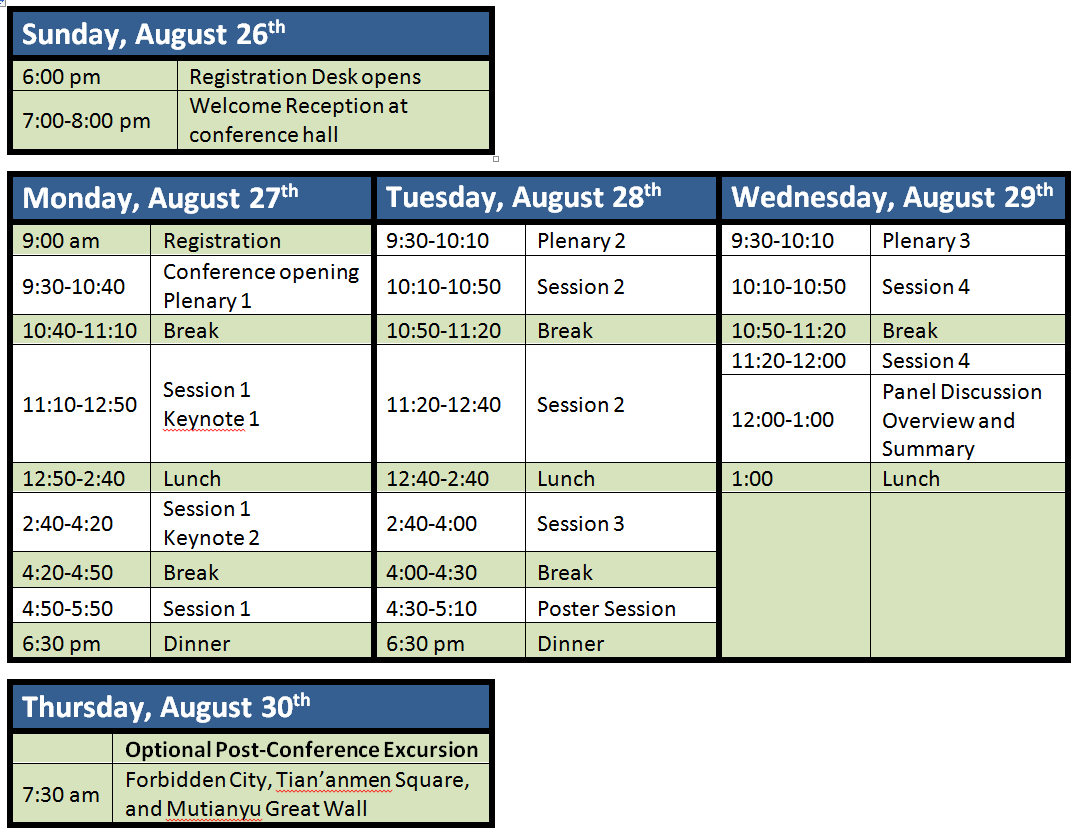23-Aug-2018: The Program-at-a-Glance is given below. A Welcome Reception will be held the evening before the conference convenes.

16-Aug-2018: For anyone visiting China for the first time, please be advised that there are various internet restrictions. For example, some of the pages and services you cannot access are WhatsApp, all Google services (Google Maps, Gmail etc).
The program and abstract book is now available on the Presentations and Program page.
14-Aug-2018: You can now sign up for the post-conference excursion! Please book by 23-Aug to claim your spot.
28-Jul-2018: A draft version of the program is now available on the Presentations and Program page.
5-Jan-2018: Due to a number of emerging issues the conference date has been moved to August 27- 29, 2018. We understand that this move may create complications for some participants and we apologize for any inconvenience this may cause. The committee did not come to this decision lightly; however circumstances beyond our control caused several participation conflicts. In the interest of having an engaging and rewarding event we felt that this was the best resolution.
As a result of the date change we will be re-opening abstract submission until March 18, 2018, and early registration will be effective until May 21, 2018.
Background
Aquatic invasive species (AIS) are a global environmental issue in both marine and freshwater ecosystems and have had significant impacts on global ecology, habitats and economies. A wide range of aquatic organisms are being transported routinely through human activities such as international shipping, aquaculture and stocking programs, as well as live trade. The high volume of international marine traffic operating in the Asia Pacific region presents an obvious risk for the transfer of AIS, yet invasion biology in the Asia Pacific region is understudied. As elsewhere in the world, it is hypothesized that introductions to this highly populated region have resulted in ecological impacts including competition with and predation on native species, changes to nutrient cycling, and food-web alterations. Other impacts include biofouling of man-made structures, depletion of economically valuable populations and deterioration of coastal habitats. There is an urgent need to understand the risks posed and to implement preventive actions; to exchange information with experts around the world managing similar species and vectors through a state-of-the-art international conference.
This is the third in a series of international conferences on AIS organized by the Aquatic Ecosystem Health & Management Society (AEHMS). It follows the meetings in Oman (Feb. 2014) and Argentina (2016). The event is a part of the AEHMS’s plan to promote understanding and management of AIS in lesser studied regions of the world. Like the previous conferences, it aims to bring together leading researchers and managers from Asia Pacific, South East Asia and across the world, to share the current state of knowledge on the biology, ecology, impacts, risks, and management of both marine and freshwater AIS and their vectors. The Key Laboratory of Environmental Biotechnology, Chinese Academy of Sciences, Beijing, China and the AEHMS, Canada are jointly organizing the event, and we cordially invite all researchers, managers, students to take advantage of this unique opportunity.
If you are interested in attending MFIS-China and would like to receive updates and information, please fill out the Intent to Participate form.
Our Host City
Beijing (北京) is the capital of the People’s Republic of China and is located in the northeastern part of the country, approximately 100 km from the sea. It is one of the Four Great Ancient Capitals of China (Beijing, Nanjing, Luoyang and Xi’an), having been the seat of the Ming and Qing dynasty emperors. Due to its rich history, the city is full of famous sights, including seven UNESCO World Heritage Sites, such as the Forbidden City, parts of the Great Wall, and temples like the Temple of Heaven.
In May, the temperatures have highs around 26°C (79°F), and lows at 14°C (57°F). The Air Quality Index for the last half of May in 2017 was between 50 and 150 for Beijing, so participants should expect some air pollution.
Beijing has rectangular “ring roads” that go around the city and serve as good reference points. The venue for the conference will be the Xijao Hotel located in the Wudaokou area of Beijing, between the fourth and fifth ring roads.
The area is a popular commercial center due to several universities located nearby. The hotel is a short walk from restaurants, shopping and the Wudaokou subway line stop. A short taxi ride will reach the Summer Palace and Yuanmingyuan Park (the Old Summer Palace and imperial garden, now a scenic park).
For more information on Beijing, please see the website of the Beijing Tourist Administration.

